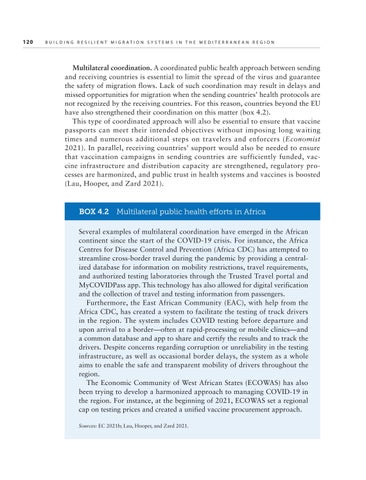120
B U ILDING RESILIENT MIGR A TION S Y STEMS IN T H E MEDITERR A NE A N REGION
Multilateral coordination. A coordinated public health approach between s ending and receiving countries is essential to limit the spread of the virus and guarantee the safety of migration flows. Lack of such coordination may result in delays and missed opportunities for migration when the sending countries’ health protocols are not recognized by the receiving countries. For this reason, countries beyond the EU have also strengthened their coordination on this matter (box 4.2). This type of coordinated approach will also be essential to ensure that vaccine passports can meet their intended objectives without imposing long waiting times and numerous additional steps on travelers and enforcers (Economist 2021). In parallel, receiving countries’ support would also be needed to ensure that v accination campaigns in sending countries are sufficiently funded, vaccine infrastructure and distribution capacity are strengthened, regulatory processes are harmonized, and public trust in health systems and vaccines is boosted (Lau, Hooper, and Zard 2021).
BOX 4.2 Multilateral public health efforts in Africa Several examples of multilateral coordination have emerged in the African continent since the start of the COVID-19 crisis. For instance, the Africa Centres for Disease Control and Prevention (Africa CDC) has attempted to streamline cross-border travel during the pandemic by providing a centralized database for information on mobility restrictions, travel requirements, and authorized testing laboratories through the Trusted Travel portal and MyCOVIDPass app. This technology has also allowed for digital verification and the collection of travel and testing information from passengers. Furthermore, the East African Community (EAC), with help from the Africa CDC, has created a system to facilitate the testing of truck drivers in the region. The system includes COVID testing before departure and upon arrival to a border—often at rapid-processing or mobile clinics—and a common database and app to share and certify the results and to track the drivers. Despite concerns regarding corruption or unreliability in the testing infrastructure, as well as occasional border delays, the system as a whole aims to enable the safe and transparent mobility of drivers throughout the region. The Economic Community of West African States (ECOWAS) has also been trying to develop a harmonized approach to managing COVID-19 in the region. For instance, at the beginning of 2021, ECOWAS set a regional cap on testing prices and created a unified vaccine procurement approach. Sources: EC 2021b; Lau, Hooper, and Zard 2021.

